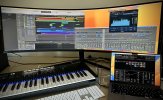Maybe it's gotten better, but I've had more Time Machine backups fail than every other backup system I've used combined. I honestly think it's just a waste of disc space.
For hardware vs. software RAID....your options on Mac are somewhat limited. It might just be ZFS via Fuse and SoftRAID (XT) from OWC. I'm not aware of another one.
But....unless I'm mistaken, software RAID predates hardware RAID...a lot of non-pro raid cards are actually software running on a microcontroller, and software raid has been the standard in the unix world pretty much forever (remember, OS X started as OpenBSD userland and a Mach kernel....and I think it's still Posix compliant). And Windows Storage Spaces actually got good at least for raid 1 and 10. I'm also of the opinion that parity raid is kind of silly at this point unless you're talking about scale that makes multiple redundant storage servers makes sense. Drives are too cheap (other than Mac internal modules).
All that is to say that unless you're using VMWare or need blind swap because you're installing in a datacenter...software raid is generally the way to go.
On a Mac, I'd probably go with some thunderbolt DAS, probably from OWC. The Thunderbay 4 Mini would work for me, with one big raid 10 of SSDs. But, I also only need a few TB of live storage. At this point, I'd also probably have a Synology box (that clones itself to a cloud) with spinning rust, also in raid 10, for backups using their backup agent. It at least hasn't catastrophically failed and needed to have the data dropped yet (had that happen to several time machine things, including one of the magic boxes apple used to sell).
That's a heck of a lot more expensive than just 2 TB of internal storage (even from Apple), but ... I would trust it more.
FWIW, I'm actually using a FreeBSD machine with a zfs span over mirrors (not exactly raid 10) of SSDs (speeds over 10GbE are similar to local SATA SSDs, mostly thanks to the way ZFS does caching and that server not doing anything but storage and having 128 GB of RAM), which backs up to a synology, which backs up to backblaze. In reality, I'd probably just pay for a dock with 10 GbE and keep using what I'm already using.


